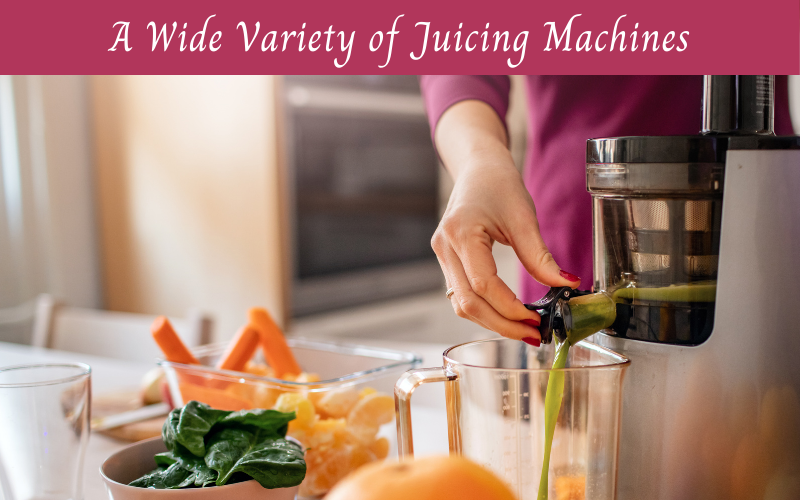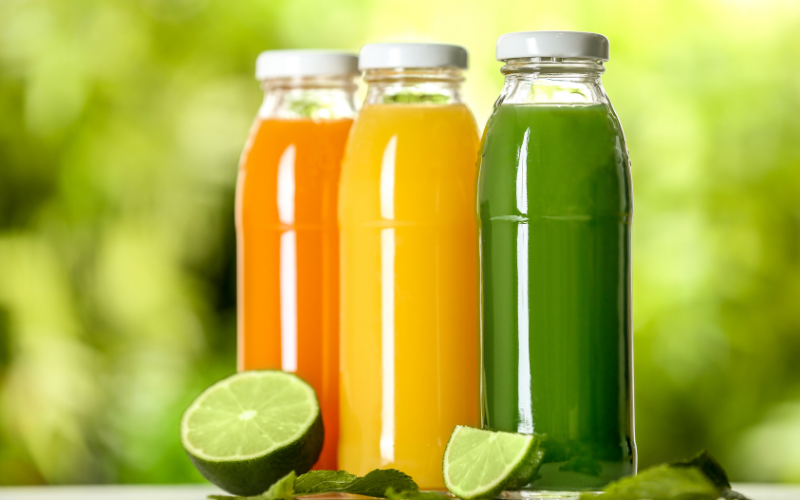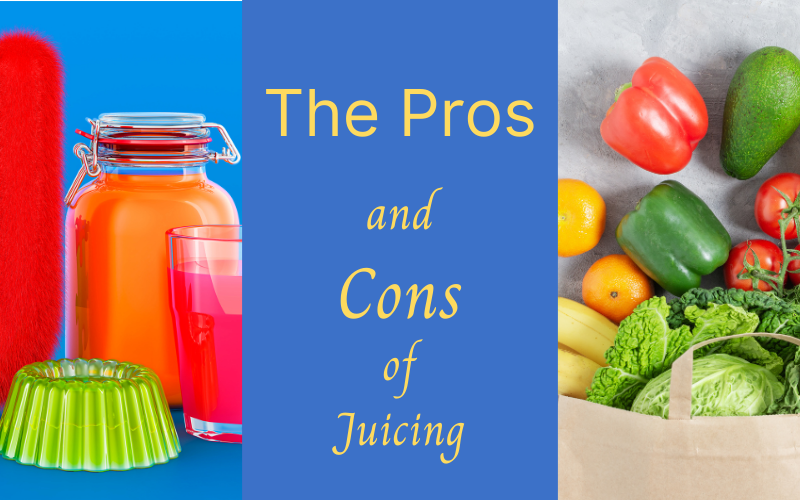Juicing is a trendy topic in today’s health-conscious world. But this isn’t just a fad; it’s a practice with deep roots and evolving techniques. Let’s take a look at some of the pros and cons of juicing.
Juicing, at its core, is the process of extracting juice from fresh fruits and vegetables to create a nutrient-rich liquid. Its appeal often hinges on the promise of a concentrated dose of vitamins and minerals in an easy-to-drink form.
The History of Juicing
The roots of juicing stretch back as early as 150 B.C. It has been in the spotlight since the 1920s and 1930s and became even more popular in the 1970s.
Three pioneers of the juicing industry were Gayelord Hauser – 1895-1984, Jay Kordich – 1923-2017, and Norman W. Walker who invented the first juicing machine.
Improvements to the juicing process have been made, and the public attention has increased and decreased throughout the decades.
Today, a wide variety of machines and methods are available for juicing, signaling its steady rise in mainstream health culture.

Seeing the Whole Picture
To really understand juicing, we need to look at the full picture. We’re going to look at both sides of the story, including the sweet—literally and metaphorically—along with the not-so-sweet aspects.
Up next, let’s explore the various reasons why so many people are deciding to give juicing a spot in their diet.
This post contains affiliate links. If you click on and purchase through one of those links, you won’t pay a penny more, but we’ll get a small commission, which helps keep our website operating. Thanks! As an Amazon Associate, I earn from qualifying purchases.
Kuvings Whole Slow Juicer REVO830W Cold Press Masticating Juicer Machine
Aeitto Cold Press Juicer Machines, Large Capacity, High Juice Yield, Masticating Juicer
1300W KOIOS Centrifugal Juicer Machine
Why People Love Juicing
First off, let’s talk about why juicing has become so popular. One big reason people add it to their daily routine, is all the benefits it brings.
It brings loads of nutrition. Plenty of vitamins and minerals are packed into each glass.
They are easy for your body to absorb, plus, it helps you stay hydrated.

Staying Hydrated
For some people, staying hydrated can be difficult, but juicing helps make it more manageable.
That’s because they bring a refreshing taste along with their natural flavors and added H2O.
Plus, it’s a tasty way to try new fruits and veggies! If you’re looking to shake up your culinary life a bit, juicing introduces a kaleidoscope of fruits and vegetables you might not otherwise try.
When you strip down fruits and veggies to their liquid essence, you’re skipping the digestive labor and streamlining those nutrients right into your system.
Weight Loss
People also like juicing for weight loss. It’s a popular tactic due to the low-calorie nature of many juices when veggies are the star players.
Detox
There’s also the buzz around detoxification; although, it’s worth remembering that our bodies are pretty good at detoxing on their own. Let’s keep in mind, your body is already a detox pro thanks to your liver and kidneys.
Disease Prevention
Some say it helps prevent diseases too, thanks to all those vitamins and antioxidants.
Heartening stories of juicing for disease prevention circulate widely.
There’s talk of bolstered immune systems, with vitamin C and antioxidants being the lyrical heroes.
Several health professionals champion juicing for its role in an overall balanced diet, although, they’ll often advise it as part of a meal rather than a sole component.
But Be a Little Cautious
Now, remember, we’re not going to throw caution to the wind. This journey through the garden of juicing will take us through some overgrown patches as well.
The next section will shed light on the flip side, making sure you’re armed with all the info you need.
Juicing Considerations: The Not-So-Sweet Side
Now that you’re familiar with the bright side of juicing, I’m going to shed light on some aspects that often go unnoticed. While it’s tempting to get swept up in the juice craze, it’s crucial to look at the full pitcher, not just the flavorful contents.
The potential risks of juicing vary depending on what types of fruits and vegetables you use, how often your drink it, and how much juice you drink.

Lack of Fiber
That said, we can’t ignore the downsides.
When you juice, one of the primary concerns, especially if you’re using a traditional centrifugal juicer, is you are separating the juice from the fiber that’s in whole fruits and veggies.
Fiber is super important in regulating your blood sugar levels. And fiber is also of paramount importance in your digestive system.
Watch Out for That Sugar
Sugar content is another sticky issue. Many juices may have about 100-180 calories in an 8-ounce glass.
When you juice fruits, the concentration of natural sugars increases. And without the balancing act of fiber, this can lead to spikes in blood sugar.
This isn’t just about taste; it’s about maintaining a balanced diet.

The Costs of Juicing
And let’s not forget about the cost. Juicing can get pricey.
From the investment in a high-quality juicer to the amount of produce needed to make a single glass of juice, your wallet might feel a little lighter.
A Complement, not a Replacement
Health experts say juicing is best as part of a balanced diet, not as the main course.
It should complement, not replace, whole fruits and vegetables. If you want to keep juicing, consider it a part of your rainbow of dietary choices instead of the whole spectrum. So, if you’re juicing, think of it as a side dish to your other healthy meals.
Balance, as in all things, is key.
No Pressure
If you’re thinking about trying juicing, take it one step at a time. Start by adding it to a meal instead of replacing the whole meal. That way, you can enjoy the benefits without missing out on other important nutrients.
Your first attempt at juicing doesn’t need to be a pressurized situation. Start slowly and learn what works best for you.
The Pros and Cons of Juicing
In my opinion, whole fruits and vegetables are very beneficial to our bodies. However, supplementing our diet with a concentration of healthy juices made from fresh produce can add valuable nutrients to our bodies.
It needs to balance out a healthy diet and should be done with wisdom, and not in excess.
This is the conclusion of the small study “Supplementation with mixed fruit and vegetable juice concentrates…” Conclusion: Supplementation with mixed fruit and vegetable juice concentrates effectively increased plasma levels of important antioxidant nutrients and folate.”
Disclaimer: If you have any concerns or questions about your health, you should always consult with a physician or other healthcare professional. No content on this site should be substituted for direct medical advice from your doctor or other qualified healthcare practitioner. The information contained here is for informational purposes only. It is from my research and personal experience.
Related Posts
What’s the Benefit of Juicing – 11 Health Benefits of Cold-Pressed Juice
The Kuvings Whole Foods Slow Juicer
Breville Juice Fountain Cold XL Juicer

